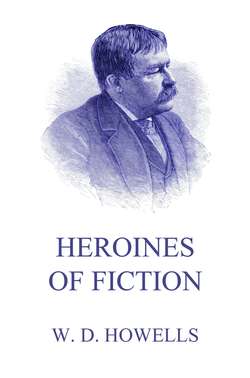Читать книгу Heroines Of Fiction - William Dean Howells - Страница 11
На сайте Литреса книга снята с продажи.
II
ОглавлениеBefore "The Vicar of Wakefield" there had been no English fiction in which the loveliness of family life had made itself felt; before Evelina the heart of girlhood had never been so fully opened in literature. There had been girls and girls, but none in whom the traits and actions of the girls familiar to their fathers, brothers and lovers were so fully recognized; and the contemporaneity instantly felt in Evelina has lasted to this day. The changes since her entrance into the world have been so tremendous that we might almost as well be living in another planet, for all that is left of the world she so trembled at and rejoiced in. But whoever opens the book of her adventures, finds himself in that vanished society with her, because she is herself so living that she makes everything about her alive.
She is of course imagined upon terms of the romantic singularity which we no longer require in letting a nice girl have our hearts. Her father is of a species so very hard-hearted as to be extinct now, even in the theatre. He denies his marriage with her mother, and destroys the proof of it for no very apparent motive (he seems to have been very much in love with his wife), except to equip his daughter with a mystery and an unnatural parent for purposes of fiction. He retires into the background of the story before Evelina is born, and does not emerge from it until he is needed to be forgiven at the end, when he bestows her hand upon the hero with proper authority. In the meantime she has been brought up in great seclusion by the Rev. Arthur Villars, a friend of her mother's father, who has devoted himself to her education, and has cherished her as if she were his own child. It is solely to him that her fondest thoughts and affections turn when at the age of seventeen she leaves Berry Hill with his approval and launches upon the gay world of London in the care of certain friends of his.
It duly appears that, besides the exceptionally ruthless father who will have nothing to do with her, Evelina has a very terrible grandmother, who was an English servant when her beauty caught the young fancy of Evelina's grandfather. He expiates his passion by many years of marriage with her in France, and after his death she returns in a second widowhood to London, just at the moment Evelina is entering the fashionable world there, and becomes the low comedy and low tragedy of the story. She is not only very awful herself, with a French bourgeois vulgarity thickly overlaying her English servile vulgarity, but she is surrounded by Evelina's city cousins, who have a cockney vulgarity all their own, and for whom she claims the girl's affection, together with her duty to herself. They complicate the poor child's relations with the finer world to which she belongs by instinct and breeding, in all sorts of ways; and if anything could prevent her predestined union with the exemplary Lord Orville, their behavior would do it. She is horribly ashamed of them, but she does nothing cruel to escape them, and she submits to her grandmother not only because she must, but because she will. In short, at the moment when snobbery was first coming to its consciousness in literature Evelina was not a snob. She otherwise shows herself a thoroughly good girl, and she does it charmingly, though she has to do it without seeming to do so, in the long letters which she writes relating her adventures and which, with those of her correspondents, form the old-fashioned vehicle of the story.
